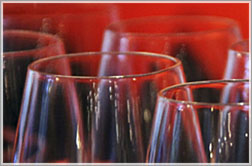 It has been known for some time that resveratrol in red wine is of great benefit to us, particularly to the health of our hearts. But why do people keep going on about resveratrol in red wine, and is it all just hype?
It has been known for some time that resveratrol in red wine is of great benefit to us, particularly to the health of our hearts. But why do people keep going on about resveratrol in red wine, and is it all just hype?
No, it is not all hype. Resveratrol is a non-flavanoid phenolic compound which is naturally abundant in grape skins of Vitis Vinifera grapes. It is found in other parts of the plant as well, such as the roots, stems and stalks, but it is in the skins where the highest concentrations lie, roughly 50-100 micrograms per gram.
Red wines gain their colour only from the grape skins during fermentation, this happens as the skins are kept in contact with the must (grape juice) by a plunging or pumping-over process. The longer this contact period lasts, the more colour is extracted, which means that the wine will absorb more resveratrol. White wines also contain resveratrol, but in lesser amounts, as the grapes are not usually fermented on their skins for any length of time.
Studies have shown that the anti-oxidants found in red wine called polyphenols assist in protecting the blood vessels of the heart. These anti-oxidant compounds can be placed into two categories: flavanoids and non-flavanoids.
- Flavanoids occur in a wide variety of foods, such as oranges, apples, grape juice, tea and cocoa. Primarily they are known as pigments for colouration of which one group, anthocyanidins is commonly found in dark coloured foods, i.e. grapes and wine.
- Non-flavanoids. These anti-oxidants can be sub-divided into three categories: vitamins, minerals and plant pigments.
Resveratrol has terrific properties, and could offer more effective protection than even vitamin C or vitamin E. That said, it does enhance the effects of vitamin C by boosting the results of both.
The benefits of resveratrol:
- Inhibits the growth of many types of cancer
- Helps in lowering the body's LDL (low-density lipoprotein) or 'bad' cholesterol, so keeping the blood vessels clear
- Reduces the incidence of blood clotting and thrombosis
- Removes amyloid-beta protein which causes brain and cell degeneration associated with Alzheimer's
- Eliminates lactic acid build-up, free radicals and dangerous toxins from the body
Wine regions with a cool, wet climate are much more likely to suffer from fungal attacks and grape diseases. It is from these areas that higher resveratrol concentrations are found within the grapes.
In parts of south-east of the United States especially Florida, the Muscadine grape with its thick skin has the highest resveratrol content (about 40mg/l) of any other variety, this concentration is found in both red and white wines. Warm, dry winegrowing areas such as Australia, South Africa and California have very much lower concentrations.
This does not mean that you should go out and drink copious quantities of Merlot, Cabernet Sauvignon or whatever other red takes your fancy. Red wine usually contains between 10% and 14% of alcohol, so the caveat here is, always drink in moderation' to get all the benefits.
Consumption of too much alcohol will undo all the good of these anti-oxidants, and will adversely affect the anticoagulant properties of the wine putting one at risk of a stroke or heart attack. As with most things in life, little and often is the recommendation for a healthy lifestyle, so avoid excessive amounts of alcohol.
Enjoy a glass of red on occasions but don't drink the bottle!
EzineArticle Source: Nature's Perfect Healer - Resveratrol in Red Wine
By Rob Hemphill



